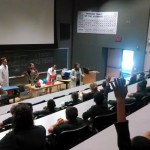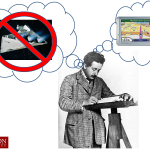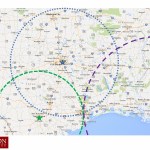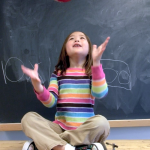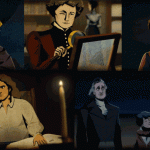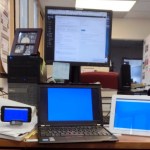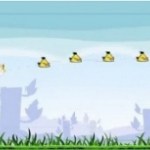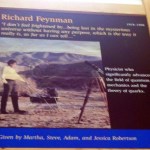Outreach
A few weeks back, a Union alumnus who works at Troy Prep contacted the college to arrange a visit for a bunch of second-graders, and asked if faculty would be willing to arrange talks and demos for the kids. I said something like "Sure, we could probably make liquid nitrogen ice cream for them," and then basically forgot about it until last week, when I said "Oh, crap, I have to make liquid nitrogen ice cream for 60 seven-year-olds on Monday!"
Fortunately, our students in the Department of Physics and Astronomy are awesome, and I was able to round up a handful of helpers from the summer…
While solo-parenting Sunday night, I still managed to get free of The Pip just barely in time to catch the start of Cosmos. This was a strange episode in a couple of ways, chiefly having to do with the selection of topics.
For one thing, there's no small irony in the fact that following a couple of weeks in which host Neil deGrasse Tyson has been raked over metaphorical coals for dismissing philosophy as pointless because it doesn't lead to testable predictions, a big chunk of the episode was given over to wildly impractical speculations about panspermia and related topics. I realize it's…
Last night's episode of the Cosmos reboot focused on one of the three physicists whose pictures Einstein kept in his office: Michael Faraday. I'm a big fan of Faraday, who famously started his career as a bookbinder's apprentice reading the books brought into the shop, and ended as one of the greatest experimental physicists of the 19th Century. Also, he had magnificent sideburns, as you can see in the picture. It's a great story-- I highly recommend his biography-- and pretty much the entire episode was devoted to Faraday, with only a surprisingly tenuous astronomy connection at the end,…
This coming fall term, I'll be teaching Astronomy 052, "Relativity, Black Holes, and Quasars," because the guy who has traditionally taught it (a radio astronomer who studies active galactic nuclei) has to do other courses instead. But I said "Well, hell, I've written a popular audience book explaining relativity. I can teach that." And since I get to make teaching assignments (the one and only positive feature of being department chair), well, I put myself down to teach it. Now, of course, I find myself thinking about ideas for that class, months in advance, when I ought to be working on…
Below you'll find the slides from my Physics Day presentations at Space Center Houston, embedded via SlideShare. I was doing the TED-style minimal text thing, so they're probably not all that comprehensible on their own.
The event was supposed to have a pop-culture connection, so I decided to use space travel and extrasolar planets as a hook for talking about relativity, thus all the movie images near the beginning. The original idea I had was to look at different fictional ways of evading the ban on faster-than-light travel, but they wanted something more in the half-hour range than the hour…
I had hoped to have another post or two scheduled for the end of this week, but The Pip got some kind of stomach bug, and threw everything into disarray. And tonight, I'm flying to Houston to give a couple of talks as part of Physics Day at Space Center Houston. Life being what it is these days, I'm still fiddling with the talk, so I don't have time to get any more big blog posts done.
If you're in the Houston area and free in the middle of the day Thursday or Friday, come by the Space Center-- I'm talking at noon both days. If you're not in Houston, or not free at lunchtime, well, I'll…
Before going to the playground Saturday to investigate non-intertial frames, SteelyKid and I went over to campus to do some experiments in relativity. Galileian relativity, that is:
What you see here is SteelyKid sitting on a rolling lab cart with a camera bolted to it. She throws a ball up in the air a couple of times with the cart at rest, then I start pushing it across the room, and she tosses the ball a few more times. You can see from the video that, other than the motion of the background, the two cases look very similar.
This is a demonstration of the principle of relativity, which…
Back when the first episode of the Cosmos reboot aired, somebody put together a composite of the cartoon people who flashed on screen, and we played a guessing game on Twitter. The image above is from a blog post by Meg at True Anomalies, and I think it was probably her, but the ephemeral nature of Twitter makes it annoying to track down the original discussion.
Anyway, we collectively got four of the five right: ibn al-Haytham in the upper left, Annie Jump Cannon in the middle top, Isaac Newton on the lower left, and William Herschel on the lower right. Well, five of six, if you include…
The finalists for the 2014 "Flame Challenge" have been selected, three written entries and three visual entries. None of these is my entry, alas, but it was worth a shot.
I watched the videos last night, and it was sort of interesting to compare what ended up working well with the test audience of 11-year-olds to the comments that I got. The main difference between what I did and what got picked wasn't so much in the use of unfamiliar words (the thing that generated comments on my post), but in the use of 11-year-old humor. (To be honest, I kind of hate one of them, because it overdoes the…
Another Monday, another recap of a new episode of the Cosmos reboot. This one was all about optics, and much of it was excellent. This was in part due to the fact that its first couple of historical segments focused on non-Western figures, and I don't know as much about their background to be able to nitpick. First up was Mozi, a Chinese philosopher from circa 400BCE, who may have been the first to demonstrate the camera obscura technique of projecting images from a pinhole in the wall of a dark room. He was followed by ibn al-Haytham, circa 1000CE, who did the first fairly complete analysis…
The fourth episode of the Cosmos reboot aired last night, and as I said on Twitter it was a beautiful demonstration of why I'm finding this show intensely frustrating. There were flashes of brilliance, but also quite a few bits that left me shaking my head. Thus fitting the pattern of the previous episodes-- I didn't comment on last week's, because I was taking a break, but it had the same sorts of issues, too-- so I guess that's just what this show is.
Again, there was some very good stuff-- the opening framing device with William Herschel talking about ghosts was great, and Tyson's tour…
This week's Cosmos was all about the evolution of life, and was viewed by millions of people outside of Oklahoma, where they presumably got an hour-long local news promo, or analysis of the Oklahoma State's chances in the NCAA Tournament. As such, it was a bit outside my area of expertise, but that never stopped a blogger before...
There were a couple of things about this that I thought were great, and two things that bothered me. The episode opened with a very nice discussion of the history of dogs and humans, demonstrating how dramatically untold generations of human selection have modified…
"So, that's the science show with space pictures. What did you think of it, honey?"
"Science. Space pictures. Awesome!"
Our umpteenth winter storm of the season delayed school two hours this morning, which is kind of the worst of all possible worlds from a parenting perspective-- when the schools are closed, there's (usually) a snow-day day-care program, but they don't take kids during a mere delay. On the bright side, though, it gave me a chance to show SteelyKid the Cosmos reboot from Sunday night. Her capsule review is at the top.
In a little more detail:
-- I asked her if she wanted to…
I alluded to this on Twitter, and meant to leave that be, but the other thing I was going to blog today didn't come together, and I probably shouldn't leave a cryptic tweet as my only comment. So...
One of the links getting passed around a lot in my social-media circles is this Tumblr post from Ben Lillie on The Humanities of Science Communication, which argues that discussions of the science of communication often seem to ignore the expertise of people who communicate for a living-- playwrights, actors, journalists, etc. This is a good point, but the post as a whole bugged me a bit, because…
Given the academic circles I run in, it's not surprising that one of the most repeated stories crossing my social media feeds yesterday had to do with the changes to the SAT. Starting in 2015, the essay section will no longer be mandatory, and they're going to reconfigure the reading and math sections to emphasize different categories of questions.
My slightly cynical take on this is that changes seem to be driven more by marketing than education-- stories about this all mention that the changes make the new SAT more like the ACT, which has been gaining in popularity in recent years. Which…
This year's "Flame Challenge" asks scientists to explain color in terms an 11-year-old can understand. The rules limit answers to either 300 words of text or a 6-minute video. 300 words is ridiculously short, so video is clearly the way to go. Of course, I'm not much of a video expert, but then, one of the finalists last year (when the question was "What Is Time?") was just a guy talking into a webcam, and hell, I can do better than that. So I did this:
(This is, obviously, why I was fooling around with looking at the spectrum of light from my laptop a little while back...)
The approximate…
I spent a while on Friday morning talking about the physics of the Olympics with a couple of science classes in Tennessee and Lawrence Norris from the National Society of Black Physicists, organized by Adam "@2footgiraffe" Taylor. This was done via a Google hangout, so the video is recorded on YouTube:
The recording seems to have mostly remained on my video feed, which is a little unfortunate. Lawrence didn't have a camera, though, so he's a disembodied voice. I liked the first question-- "What Olympic event involves the least physics?"-- though it's a tricky one to answer.
Anyway, it was a…
This year's "Flame Challenge" is to explain color in terms an 11-year-old can follow. I have opinions on this subject, a background in AMO physics, and access to scientific equipment, so I'm putting something together. In the course of this, though, it occurred to me to wonder how my different portable computing devices process color. And since I have access to an Ocean Optics USB4000 spectrometer, I can answer this question in more detail than anybody needs.
So, I have three principal electronic devices that I use to do computer-type things: a Moto X smartphone, an iPad, and a Lenovo…
The day I bought my iPad, as I was taking it out of the box, SteelyKid (then 3) came bopping into my office, spotted it, and declared "I want to play Angry Birds!" It's a remarkable demonstration of the genius of their product: not only have they created a game that a three-year-old can play, they've managed to make every three-year-old in the industrialized world aware of their product.
It's also a testament to my current obsession, the universality of science, and not just because you can use the game to illustrate physics. After all, the process of playing the game serves as a good…
While we're revisiting blog topics of the recent past, another item from this weekend's visit to the Ithaca Sciencenter, in the form of the picture above. For those with images off, or who read via RSS and won't see the picture, it's a photo of one of the inspirational plaques they have lining the walls of their community room, honoring famous scientists. This particular one is for Richard Feynman, and what struck me about it was that the photo isn't his Nobel Prize portrait, or him playing the bongos, but a somewhat grainy picture of him standing next to a telescope in the desert, pushing a…
